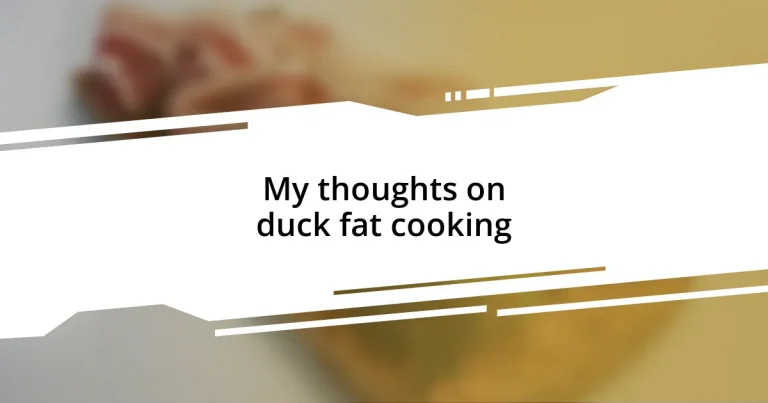Key takeaways:
- Duck fat enhances the flavor of dishes with its rich, savory, and umami qualities, offering a unique alternative to traditional cooking oils.
- Its higher smoke point makes duck fat ideal for frying and sautéing, resulting in crispier textures in foods.
- Recipes such as roasted vegetables, crispy hash browns, and seared steak shine when prepared with duck fat, transforming simple meals into extraordinary experiences.
- Proper storage techniques, including refrigeration and freezing, can extend the shelf life of duck fat, allowing cooks to benefit from its unique properties over time.
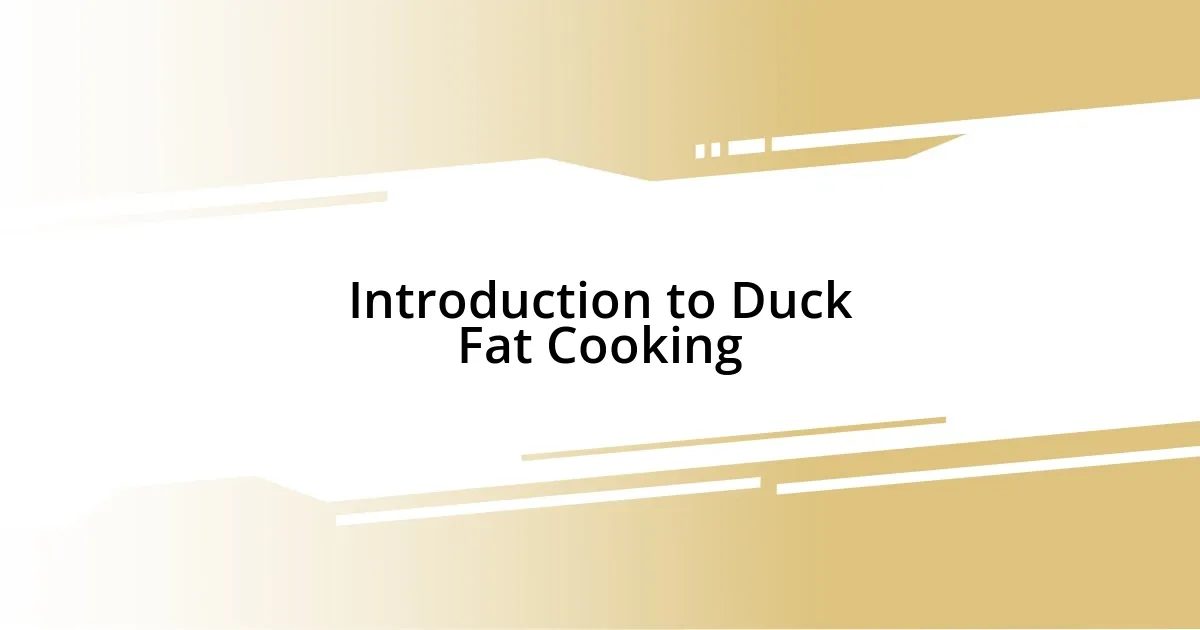
Introduction to Duck Fat Cooking
Duck fat cooking offers a culinary experience that goes far beyond what you might find with traditional cooking oils. I remember the first time I tried crispy duck fat potatoes; they were the best I had ever tasted. Can you imagine transforming a simple dish into something spectacular using just a different fat?
One of the things that intrigues me about cooking with duck fat is its rich flavor profile. Unlike many oils, duck fat has a unique, savory taste that enhances everything from roasted veggies to baked goods. Have you ever thought about how the fat you use can elevate a dish?
It’s also worth noting that duck fat has a higher smoke point than many other fats, which makes it perfect for frying and sautéing. This quality not only prevents the fat from burning but also allows for a crispier texture in foods, which I find so satisfying. Isn’t it fascinating how a single ingredient can completely alter your cooking experience?
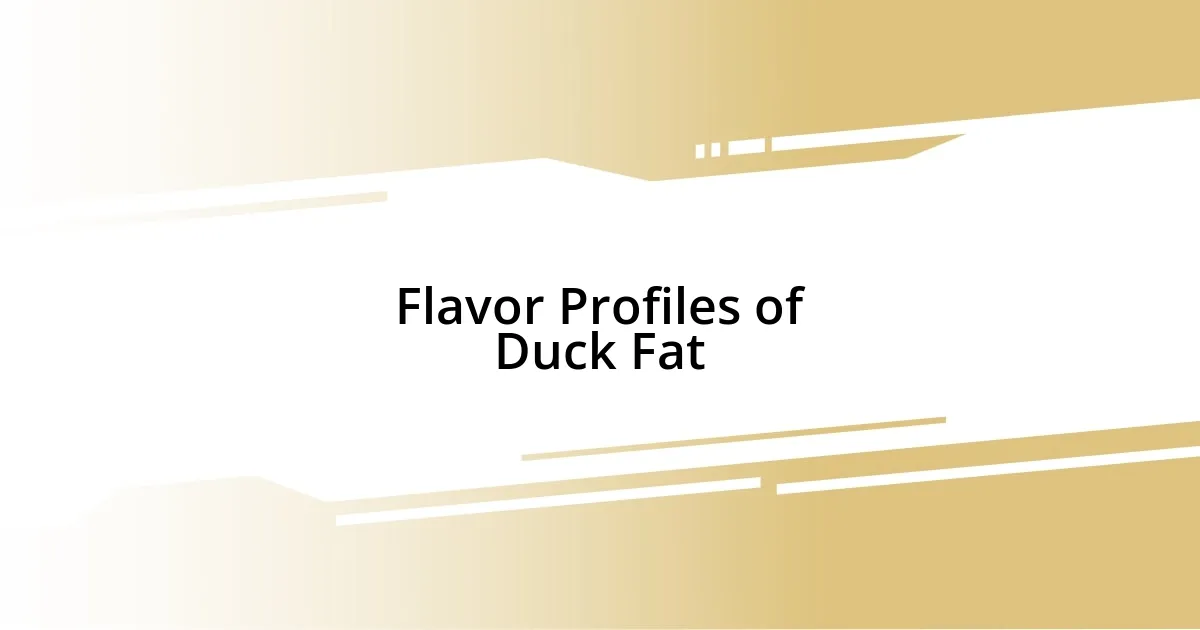
Flavor Profiles of Duck Fat
Duck fat boasts a flavor profile that is simply unmatched in the culinary world. I remember the first time I slathered it onto a rustic loaf of bread before baking. The result was a crispy crust that revealed a soft, buttery interior. It added a depth of flavor that made even the simplest ingredients shine. Have you ever tasted something that seemed ordinary but was elevated to extraordinary through just a subtle change in preparation? That’s the magic of duck fat.
What’s intriguing about duck fat is its balance of richness and subtlety. It has this beautiful umami quality—think of savory dishes enhanced by a single ingredient that whispers flavor rather than shouts. When I sauté vegetables in duck fat, they soak up that savory goodness, transforming into little bursts of flavor. It’s as if each bite tells a story, bringing warmth and comfort to the table.
In contrast, when we look at other cooking fats, they often lack the same complexity. Olive oil is fruity, butter is sweet, but duck fat offers a savory hug for your palate. I’ve experimented with various oils, yet nothing has compared to the satisfaction of a duck fat roasted chicken. Each bite tasted richer and more layered than anything I had made before. It’s this delightful contrast that keeps me turning back to duck fat in my kitchen.
| Cooking Fat | Flavor Profile |
|---|---|
| Duck Fat | Rich, savory, umami |
| Olive Oil | Fruity, peppery |
| Butter | Sweet, creamy |
| Vegetable Oil | Neutral, light |
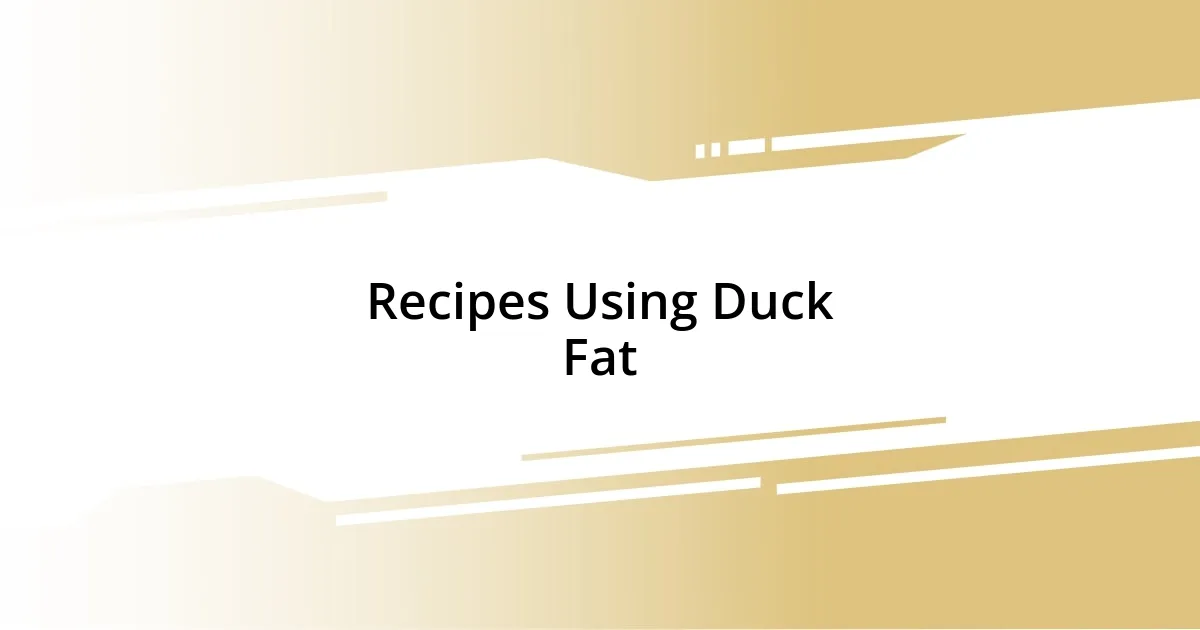
Recipes Using Duck Fat
When it comes to incorporating duck fat into recipes, the possibilities are as exciting as the flavor itself. I remember once preparing duck fat fried potatoes for a gathering; the crispy exterior and creamy interior stirred up such conversation! Everyone was curious about how I achieved that elevated flavor. Using duck fat can turn humble dishes into conversation starters.
Here’s a list of my favorite recipes that truly shine with duck fat:
- Duck Fat Roasted Vegetables: Toss seasonal veggies like carrots, Brussels sprouts, and potatoes in melted duck fat, sprinkle with salt, and roast until caramelized.
- Crispy Duck Fat Hash Browns: Grate potatoes, mix with duck fat, and pan-fry until they’re golden and crispy; serve with a runny fried egg on top.
- Duck Fat Popcorn: Drizzle hot duck fat over freshly popped corn, add your favorite seasonings, and enjoy a rich, savory snack.
- Duck Fat Biscuits: Substitute butter with duck fat in your biscuit recipe for a flaky, savory treat that pairs perfectly with breakfast or gravy.
- Duck Fat Seared Steak: Sear your steak in duck fat for a beautifully browned crust that enhances the meat’s natural flavors.
Every time I pull out the duck fat, I feel like I’m inviting a little bit of culinary magic into my kitchen. It’s not just about the taste; it’s the joy of sharing those memorable meals with friends and family that makes it all worthwhile.
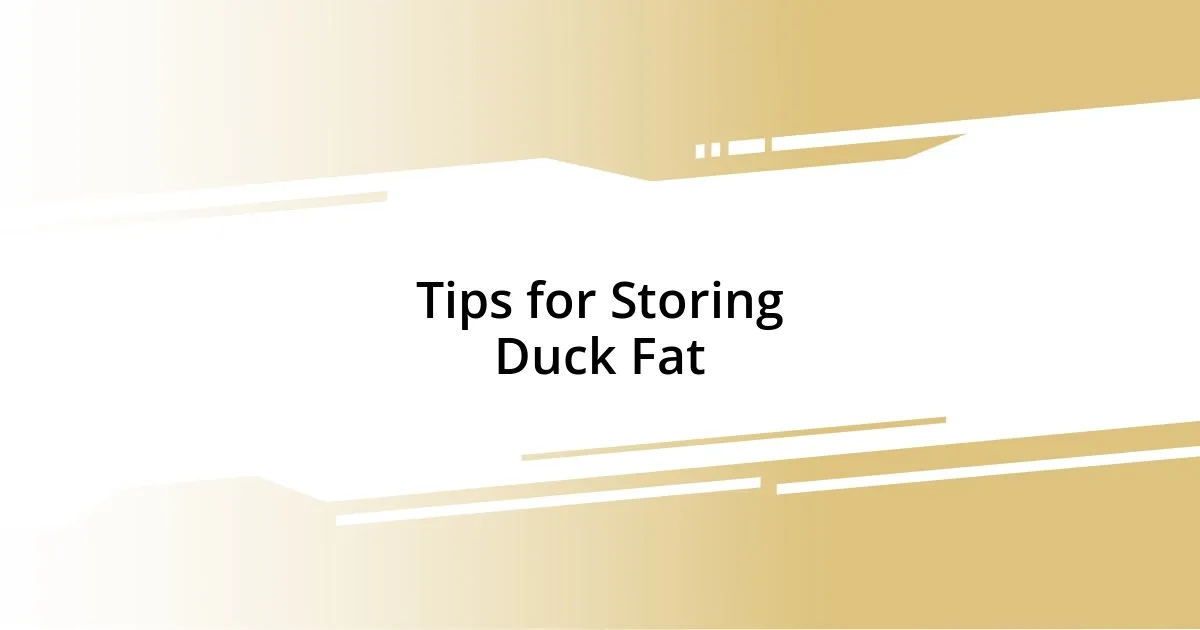
Tips for Storing Duck Fat
When it comes to storing duck fat, I’ve learned that the key is to keep it cool and dry. I usually transfer leftover duck fat into a clean glass jar, ensuring it’s sealed tightly to keep out air and moisture. It’s almost like a prized possession in my kitchen; I can’t bear to waste it after having experienced its rich benefits.
If you’re looking to prolong its shelf life, consider refrigerating it. I find that duck fat can last up to six months when chilled; however, I have sometimes noticed the texture can change slightly, becoming a bit firmer. But honestly, once it’s warmed up for cooking, it returns to that luscious texture we all adore. Have you ever found a fat that had a surprise like that?
For longer storage, freezing is an excellent option. I’ve portioned out duck fat in ice cube trays and simply pop out a cube or two as needed. It’s like having culinary treasure on hand, ready to elevate any dish at a moment’s notice. Plus, there’s something so satisfying about knowing I’m making the most of my ingredients. Wouldn’t you say that just feels right?
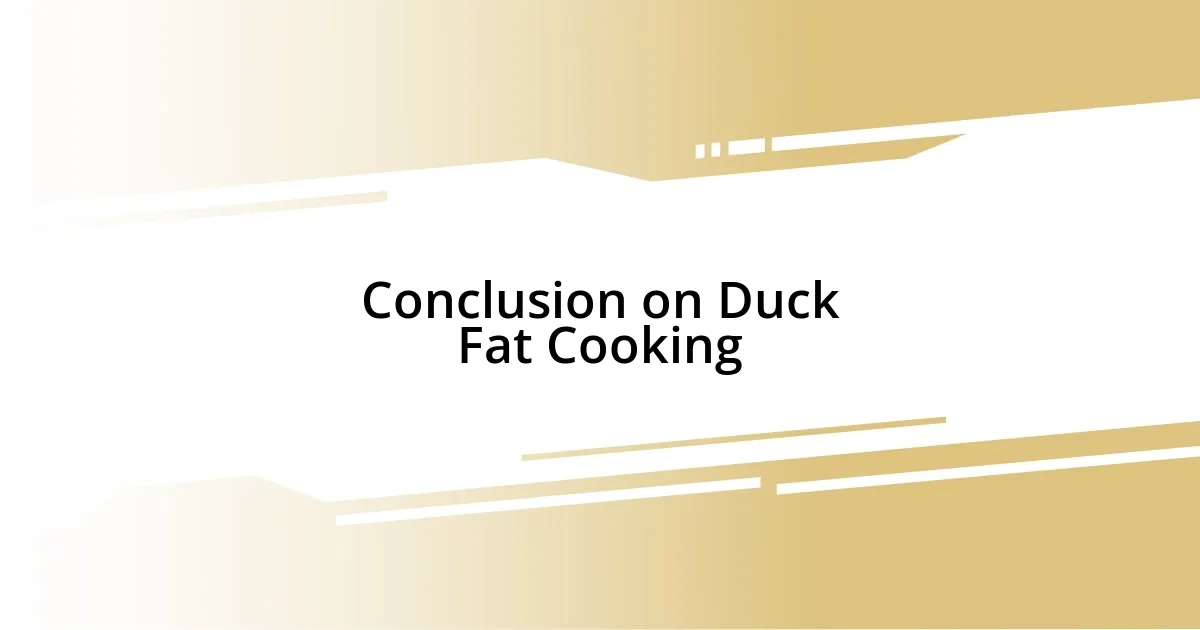
Conclusion on Duck Fat Cooking
The experience of cooking with duck fat truly transforms my culinary adventures. I recall an impromptu dinner party where I used duck fat to sauté green beans—the way it infused the dish with a deep, rich flavor elevated it from ordinary to extraordinary. Isn’t it amazing how a simple ingredient can change everything?
With its high smoke point and unique taste, duck fat is a stellar choice for various cooking techniques. I often think about how it has allowed me to explore new textures and flavors in my favorite dishes. For example, using duck fat in a simple risotto brought an unanticipated depth; it made me wonder why I hadn’t embraced it sooner.
Ultimately, cooking with duck fat feels like connecting to a culinary tradition that celebrates indulgence. Every time I use it, I’m reminded of the countless flavors and memories it brings to the table. Have you ever experienced that deep sense of satisfaction from a dish that just hits all the right notes? It makes me appreciate the journey of cooking even more.












